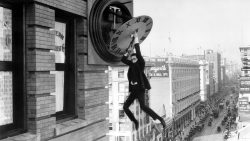Posted February 12, 2016
Wim Wenders: A Curious Adventurer with Great Soundtracks
By JBFC Programmer Andrew Jupin
If I had to list my favorite director to come out of the New German Cinema–a film movement that ran for two decades starting in 1962 and was born out of a group of young filmmakers’ reaction to the lackluster economic and artistic climate of post-war Germany–it would not be an easy task. There are excellent filmmakers from that era who never quite became household names: Alexander Kluge, Margarethe von Trotta, and Ulli Lommel to name a few. Then there are those art house staples that any half-interested cinephile has heard of like Rainer Werner Fassbinder and Volker Schlöndorff. And of course there’s everybody’s beloved, brooding, philosophical crank uncle, Werner Herzog. But Wim Wenders is an artist who has made such diverse films across so many genres and forms you often forget that he was part of that same class of young, dissatisfied, lonely filmmakers all that time ago.
My first run in with Wim Wenders’s vast filmography came during a seminar on the New German Cinema being taught by the great Greg Taylor at Purchase College. After the class had already been inspired and hypnotized by Herzog, and then subsequently gutted by Fassbinder, here came Wenders with a playful curiosity and a gentle sense of loneliness to his work we had yet to experience that semester. He also had the best soundtracks. Over the following weeks, my classmates and I took in the films you need to get hooked on Wim: titles like The American Friend, Paris, Texas, and Wings of Desire. Sure, the last two came after the movement we were studying technically ended, but hey, the Purchase library had a Raiders of the Lost Ark-esque VHS collection. VHS tapes: remember those?
Seeming to always be working on one film or other, and given that no artist can ever bat a thousand, Wenders has had his fair share of odd run-ins with the American indie scene in the last two decades: The End of Violence, The Million Dollar Hotel, Don’t Come Knocking, Every Thing Will Be Fine. But even during that time, he’s managed to put out three of the best documentaries of his career–Buena Vista Social Club, Pina, The Salt of the Earth–and also has two films in the works that may both see release in 2016. But as we anticipate the next Wim Wenders project, Portraits Along the Road is all about looking back.
It would be irresponsible for me to select which films in this series you should see over others. The beauty of Wenders’s work is that there is something for everyone and each person finds their own way into his world. What I can tell you is the series contains some real achievements including his unofficial road movie trilogy (Alice in the Cities, Wrong Move, King of the Road), The American Friend (which features one of Dennis Hopper’s finest performances), his two biggest hits (Paris, Texas and Wings of Desire), two of his best documentaries (Buena Vista Social Club and Tokyo-Ga), and, at almost five hours, the cinematic juggernaut that is the director’s cut of Until the End of the World. Additionally, we’re kicking the whole thing off with a screening of a film that lies outside the Portraits Along the Road set list, and that is Pina in 3D (the Burns wasn’t equipped for 3D when the film was originally released and we figured we owed it to our audience to screen it the way Wim intended it to be seen).
I revisit the films from New German filmmakers quite often, but I’m always the most curious and most at attention when I’m going through Wim’s old gems. When selecting which of his films from this traveling series–a series presented by the fine folks at Janus Films and the Wim Wenders Foundation by the way–I was sitting watching Alice in the Cities and it dawned on me that it was films like that (and several others of Wim’s) that spurred my interest in art cinema in the first place. So there you have it, Wim Wenders: a filmmaker so grand, his work reminds you why you love this medium as much as you do. And that’s a totally responsible thing for me to say.
Wim Wenders: Portraits Along the Road screens at the Burns March 4–16. Tickets are on sale now.



